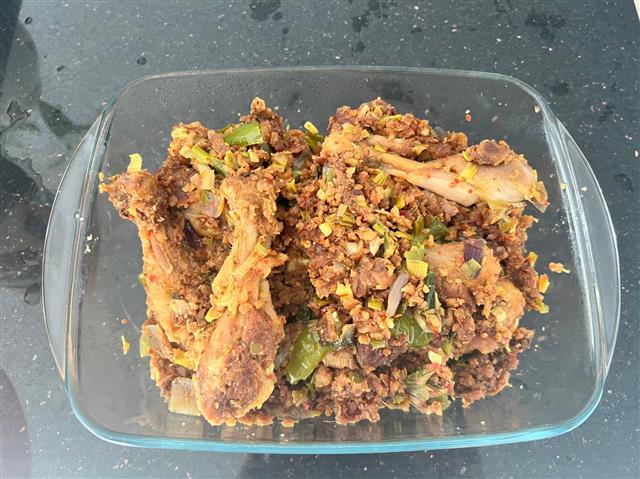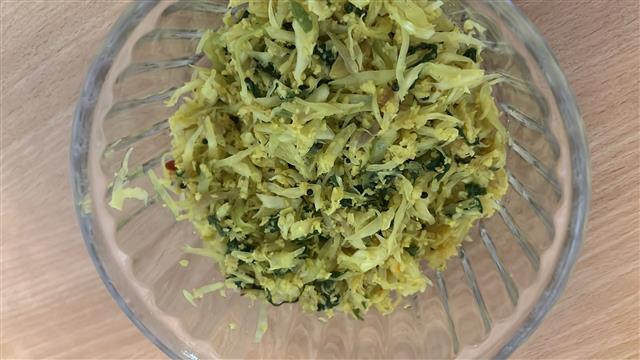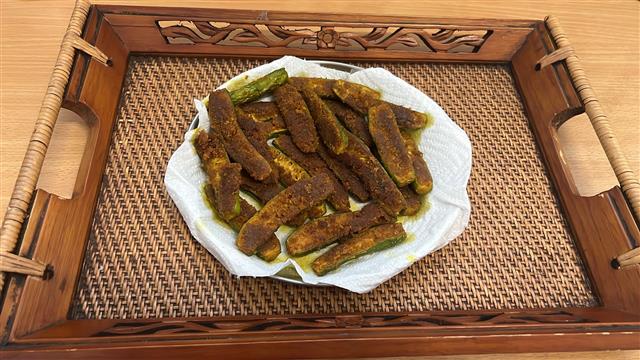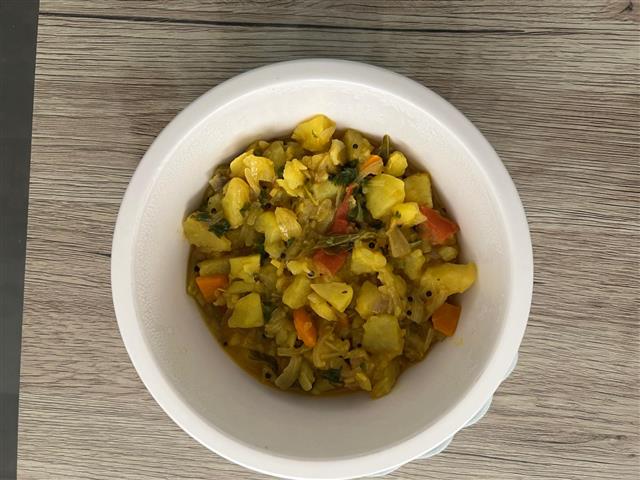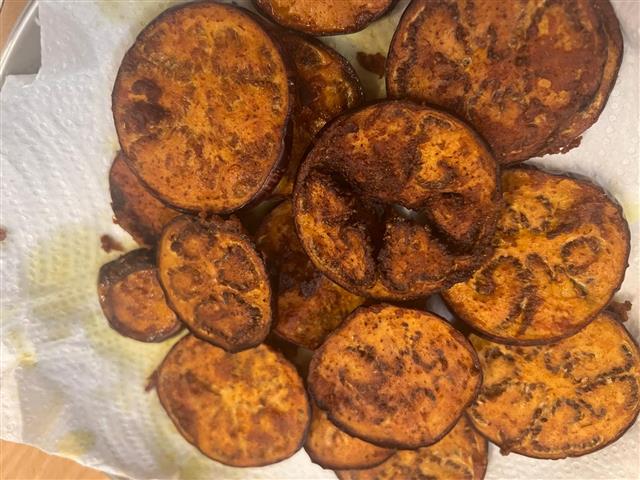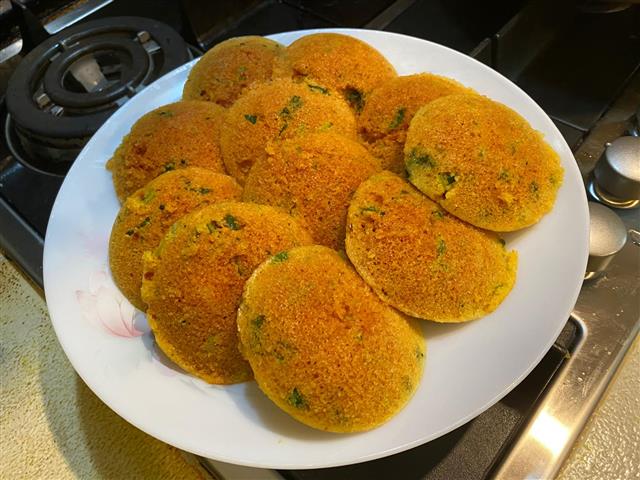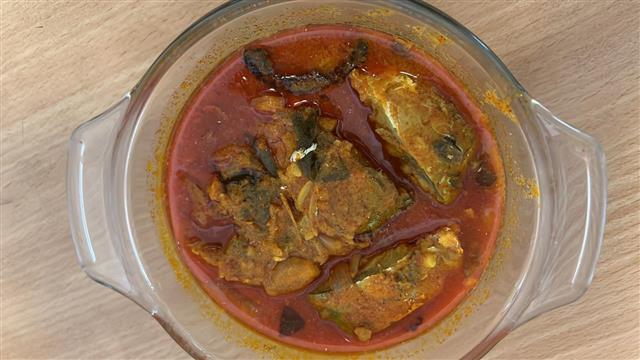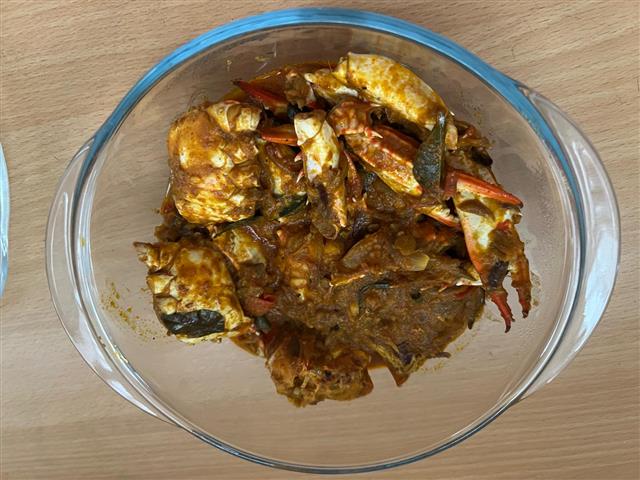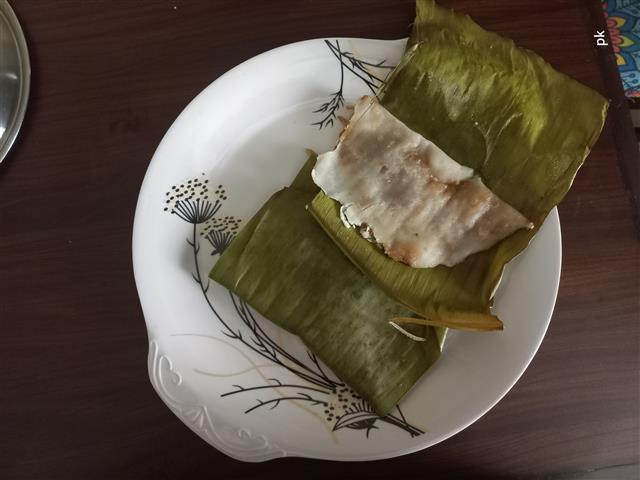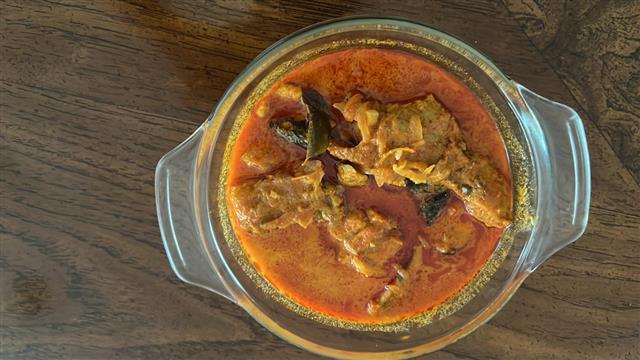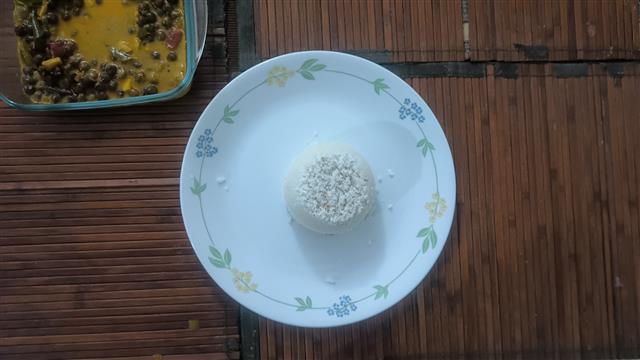
Karimeen Pollichathu
(4 reviews)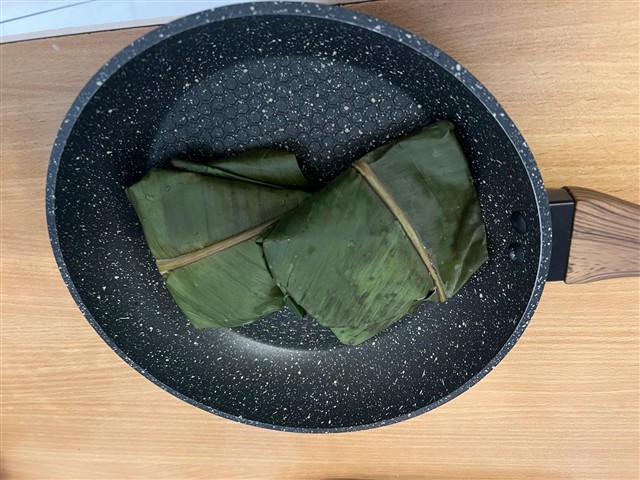
Karimeen Pollichathu is one of Kerala's most iconic seafood preparations Fresh pearl spot fish is marinated in spices, gently pan-roasted in a banana leaf, and infused with a smoky, earthy flavor that's truly unforgettable.
A signature dish of the backwaters, this recipe is all about balancing bold spices and smoky aroma, with the delicate sweetness of the fish. Sealing in a banana leaf imparts the natural scent of the leaf.
Ingredients
Directions
- Chop the onions, mash the ginger and garlic, and set aside. Rinse the banana leaf in hot water.
- Make light gashes all over the fish on both sides. Add salt, chilli powder, turmeric powder, and vinegar to the Karimeen and marinate it for 15 minutes.
- Heat 1 to 2 tablespoons of coconut oil in a frying pan or tawa and fry the fish lightly. Set aside
- In another saucepan or the same frying pan, add one tablespoon of oil, chopped onion, shallots, green chillies, ginger, and garlic. Saute until the onions and shallots turn golden brown.
- Add tomatoes and salt, and water. Saute well until it's mushy and the liquid has evaporated.
- Divide the masala in four parts and set aside. Add a little oil to the banana leaf and add one part of the prepared masala to each leaf. Spread it enough to coat the fish.
- Place fish on a banana leaf and add cover each fish with the remaining masala paste. Make sure it coats both sides well.
- Fold the banana leaf around the fish. Tie the leaf with a string to keep it in place. Place it in a chapathi tawa (flat pan).
- Cover with a lid and cook on a low flame for 8 to 10 minutes,
- Flip halfway through to cook the other side. Cook until the leaf is slightly charred on both sides, and the fish is cooked through.
Cooking Tips
• Use fresh fish. Karimeen is delicate, and freshness is key for both flavour and texture.
• Use thick banana leaves. Wilt them over an open flame briefly to make them pliable.
• Cook on low heat with a tight lid. This ensures the fish cooks evenly without burning the leaf.
• Use coconut oil for an authentic, smoky aroma that complements the banana leaf's natural scent.
• If using frozen Karimeen, thaw it completely and pat it dry before marination.
Marination Tips
• Don't skip on the marination time.
• Ensure you rub both sides well.
• Make gashes on both sides of the fish for the masala to be absorbed.
How to Serve
• Lemon wedges, tomato slices, and onion slices
• Salad and lime wedges•
• Steamed matta rice (Kerala red rice) and a light moru curry for an elaborate lunch.
• Appam or Idiyappam for a weekend family brunch.
The Story Behind Karimeen Pollichathu
The origins of Karimeen Pollichathu can be traced back to the fisherfolk communities of Kerala's backwaters, especially around Kuttanad and Alappuzha. Fishermen would wrap their fresh catch in banana leaves, which were abundant and natural. This protected the fish from direct fire and kept it moist during cooking over open flames.
What is Karimeen Pollichathu? In Malayalam, Pollichathu means roasted or grilled in a wrap. It refers to the unique method of marinating and cooking food wrapped in a banana leaf, often over a tava or pan. You can even use steamer baskets or broil in the oven. It's a technique that locks in moisture, aroma, and flavour.
This humble, resourceful cooking method is now synonymous with a unique Kerala style of cooking, fish in a wrap. You'll find this served at celebrations, festivals, family gatherings, and special occasions.
Wrapped in the earthy aroma of banana leaves, the marinated Karimeen sizzles gently on a hot tava, soaking in the rich, spiced onion-tomato masala. As the leaf crisps and darkens, it locks in the smoky flavours, letting the fish steam slowly in its juices. The result is tender, flaky flesh bursting with coastal spices.
Ingredient Spotlight
Karimeen or Pearl Spot is more than just a fish in Kerala; it's a cultural icon. Nutritionally, it's high in protein, low in fat, and rich in omega-3 fatty acids, thus supporting heart and brain health.
It's also easier to digest compared to red meat or shellfish, making it suitable for all age groups.
The banana leaf imparts subtle earthy flavours and holds moisture, acting as a natural steamer.
Today, Karimeen Pollichathu is a signature dish in Kerala's coastal cuisine and a tourist favourite at local seafood restaurants.
Unwrapping the fish is like opening a parcel of tradition, aroma, and indulgence. This is an irresistible invitation to dive into Kerala's culinary soul.
Pro Tips for Perfect Results
→ Banana leaf prep: To prevent tearing, soften the leaves by passing them over an open flame or soaking them briefly in hot water before use.
→ Control smoke: Use low heat and cover the pan to keep smoke minimal.
→ Seal well: Secure the banana leaf tightly using toothpicks or kitchen twine to trap steam and tang during cooking.
→ Flip once: Flip the wrapped fish carefully halfway through cooking to get an even roast and a subtle char on both sides.
→ Resting: Let the cooked fish rest wrapped for 5 minutes after cooking to allow the flavours to settle.
Karimeen Pollichathu Variations
With other fish varieties: Use Pomfret, Kingfish, Mackerel or Black Bream instead of Pearl Spot
With Curry leaves: Some homecooks add curry leaves on top of the fish before covering it with banana leaves, for a herby touch.
Skip Green Chilli: To tone down the heat level, skip the green chillies or add peppercorns to the masala.
Steamed Version: Skip frying the fish before wrapping if you prefer a lighter meal.
With Coconut Milk: Add 1/4 cup coconut milk instead of water for a creamier paste.
Storing & Reheating Tips
→ Fridge: Keep any leftovers wrapped in the same banana leaf in an airtight container. Refrigerate for up to 2 days.
→ Reheat: From fridge: Reheat in a pan (with a little oil) on low heat, covered, to retain moisture.
From freezer: Thaw overnight in the fridge, then reheat as above. Place on a hot tawa or pan with a few drops of water, cover with a lid, and heat gently.
Tip: Avoid microwaving as it'll dry the fish out.
→ Freeze: Cool the fish well. Cover it with foil or place it in an airtight freezer-safe bag. Freeze for 2 weeks.
Tip: If the fish is slimy to the touch or smells odd, discard it.
Common Mistakes to Avoid
→ Overcooking the fish: During the pan-fry stage can make it dry and tough.
→ Not softening the banana leaf: Can cause it to tear when folding.
→ Too much vinegar or salt in the marinade: Can overpower the fish's natural sweetness.
→ Cooking on high flame: May char the banana leaf too quickly before the fish cooks through.
Frequently Asked Questions
- Can I make this without banana leaves?
Yes, though it won't have the same flavour. Use parchment paper or foil as a substitute.
- What fish can I use if Karimeen is unavailable?
Pomfret, Kingfish, Black Bream, and Mackerel are great alternatives with firm flesh and mild flavour.
- Can this be oven-baked?
Yes, bake in foil at 180°C (350°F) for about 20–25 minutes, flipping halfway if wrapped tightly.
- Is this very spicy?
It's medium spice. You can adjust the chilli powder and green chillies based on your heat preference.
Equipment Needed
→ Flat chapati tawa or frying pan with a lid
→ Banana leaves (or foil as backup)
→ Bowl for marinating*
→ Flat spatula for gentle flipping
→ Kitchen String or Banana Fibre (optional, for securing leaf folds)
→ Knife for makes gashes
